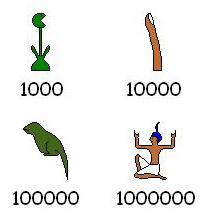""Amir Aczel’s new book desperately wants to be an adventure story. He describes his travels as an “odyssey” and a “great adventure,” and compares himself to Indiana Jones. He imagines that a taciturn taxi driver in Vietnam might rob or kill him. (Nothing happens). He favors breathless rhetorical questions that suggest danger and daring. When he closes one chapter with the ominous query—“Could I rediscover it?”—you can almost sense the hostile natives hiding in dense jungle with poisoned blow darts trained on his head.
The key part of his question is the prefix “re.” Aczel is not discovering something new; as he freely admits, he’s searching for an inscription that was already discovered in 1891 and translated in 1931. The inscription contained a small dot of great importance in the history of ideas—it was the oldest extant zero. (Well, except for the Mayans and arguably the Babylonians.) When he finds the artifact with this inscription languishing in a Cambodian warehouse, he struggles to express the staggering significance of his own work: “This is the Holy Grail of all mathematics, I thought. And I found it.”
Finding Zero: A Mathematician’s Odyssey to Uncover the Origins of Numbers is a strange and frustrating book. How the concept of numbers—and zero in particular—originated and developed is a fascinating topic rich with philosophical and practical implications. Aczel intermittently engages with these themes in a meaningful way, but much of the book is clogged with irrelevant and grandiose first-person material. He crisscrosses large swaths of Southeast Asia, but the most perilous thing that happens outside of his imagination is a routine shakedown by a customs official looking for a bribe. It doesn’t help that his idea of travel writing involves prose that would fit nicely in a botanical encyclopedia. (“later on the ground I identified ficus and giant tualang and dipterocarp, which can reach 200 feet and are often covered with lichens.”)
Aczel seems to fear that if he does not devote sufficient space to describing the peasants, snake charmers, and exotic flora he encounters, his readers might recoil in horror once they realize his subject is mathematical and philosophical. An obsession with the sensory is an odd quality in a book on the origins of numbers—concepts that are abstractions removed from the physical world. The moment when some humans first realized that three oranges, three dogs, and three fish all share some property of “Threeness” would not make for riveting cinema. It was an intellectual achievement: a recognition of a new way to understand the world. With the right guide, considering the nuances and implications of number theory and its history would be sufficiently interesting.
To appreciate why abstracting the concept of numbers away from particular things is an achievement, try to imagine a world without such a concept. One piece of evidence that might come from a pre-numerical world is the fibula of a baboon from roughly 20,000 years ago. It’s marked with a series of vertical notches that appear to represent early evidence of counting. Two human ancestors comparing tallies on baboon bones would probably have a rough sense of magnitude: if every hunter in the tribe made a notch for each animal he killed, the best hunter could display a bone with more notches.
But a sense of relative magnitude would not necessarily require a concept of numbers. You might know that the chief had more kills than anyone else without knowing precisely how many he had. We might even extend the paleo-fantasy and imagine a tricky rival fooling people by subtly increasing the space between each mark, thus creating the appearance of a greater number of marks (college students still use this tactic by adjusting the spacing and margins on papers).""
Learn More:




No comments:
Post a Comment